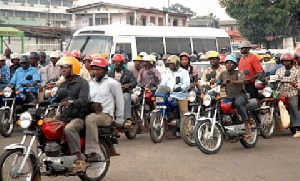The Upper East Regional Minister and Member of Parliament for Bongo, Albert Abongo, has announced the region will soon import protective helmets and force motorcyclists caught bareheaded to buy them on the spot.
The action is driven by the spate of road crashes in the area in recent times.
“When you are riding or driving, you watch; complete carelessness. No regulations. We are losing a lot of our youth. Some are getting seriously maimed. Simple accidents, they get their heads knocked on the ground and they are dying or getting maimed as a result. I have a problem with that. For me, one intervention is I will tell the police to get a businessman who can import helmets. When he brings the helmets, when you’re caught, whether you have a helmet in the house or not, you will buy. You will just go to the shop and buy a fresh one. I will discuss it with the police,” the minister stated when he addressed the coalition of SADA sone CSO’s who paid a courtesy call on him at Bolgatanga, the Upper East regional capital.
The meeting discussed way to advance the cause of the Savannah Accelerated Development Authority and general security in the area.
Why Upper East motorists despises helmets
At least 192 road crashes hit the region in 2015, leaving 183 people injured and 64 dead. The National Road Safety Commission (NRSC) attributed most of the deaths to speeding and failure to wear protective helmets.
Many motorcyclists in the region hardly wear protective helmets for a number of reasons. According to the Upper East Regional Manager of the NRSC, Mohammed Atilado, residents are shunning helmets because they produce heat and they disorganise the hairdos of women.
“Especially with the women, because of their hairdo; when they wear the helmet, it disorganises their hairdo. And generally because of the heat, some don’t want to wear helmet. Also when you are on helmet, you don’t hear when someone is calling you from afar. Others say they don’t feel comfortable at all when they wear helmet,” Mr. Atilado told Starr News.
Head injuries major cause of accident deaths
The leading causes of fatal crashes in the region, according to the NSRC, are speeding and refusal on the part of motorcyclists to wear crash helmets.
“Most of the victims here are motor riders the majority of whom don’t wear crash helmets. So, as soon as they get the crash, they definitely have head injuries which lead to death. We think that wearing of helmets will help reduce the number of people who die,” Mr. Atilado once remarked in an interview with Starr News.
Early this month, 14 people were arrested in Bolgatanga for a number of road-safety-related offences during a special operation launched by the Upper East Regional Police Command. The accused persons have been heavily fined by the court on charges ranging from driving with expired licence and expired road worthiness certificates, riding unregistered motorcycles, driving without seat belts to riding without protective crash helmets among others.
Police too hard on us? Coalition
Security issues raised by members of the Coalition of SADA zone CSOs during the meeting with the minister bordered on alleged harsh treatment from the police and the wave of armed robbery attacks in the region.
“The police have been very hard on us. We are not saying they should not arrest us. But we are saying that when they do, they should be professional. They take a lot of money from us. They can take between forty and seventy cedis when they arrest you [riding] without helmets,” Seidu Mustapha, a representative of the Upper East Youth Association, said.
Upper East Regional Chairman of the Ghana Coalition of NGOs in Health, Noble Asakeya Alagskomah, suggested a revisit to the community watchdog model to help stem the tide of armed robbery in the region.
“The other thing we want to raise is that you appeal to your MDCEs to revisit the community watchdog concept. The police are doing well; but the number of the citizenry outweighs the number of the police. So, if we revisit that concept, the crime wave can be properly managed,” Mr. Alagskomah said.
Regional News of Friday, 25 March 2016
Source: starrfmonline.com













